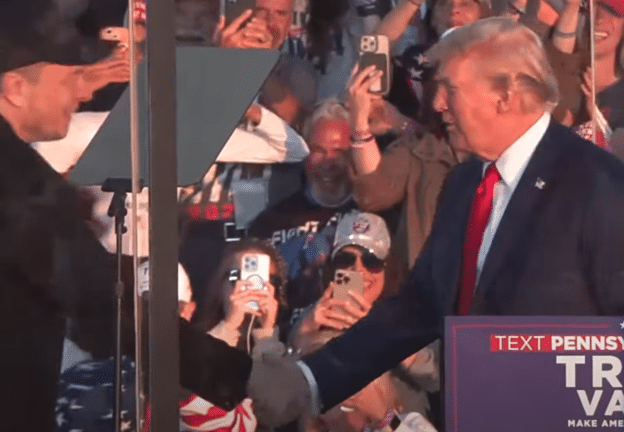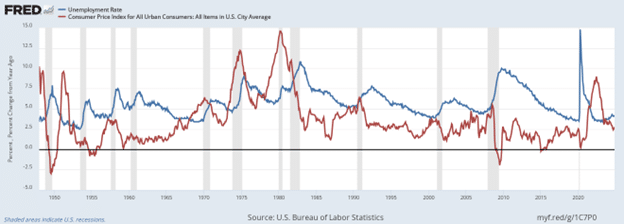
December 11, 2024
Permission to republish original opeds and cartoons granted.
Trump Vows to Slash Government Bureaucracy as Public Trust in Government Craters
| 
|
|
President-elect Donald Trump just announced his sweeping plan to slash the size of the federal government through a new government agency run by businessmen Elon Musk and Vivek Ramaswamy. The temporary agency, which Trump has named the Department of Government Efficiency (DOGE), will be tasked with slashing government bureaucracy, ending nonsensical regulations, and cutting wasteful expenditures, initiatives the American people appear all too happy to see put into action. Polling shows public trust in government has cratered in recent years, and a majority of voters want to see significant reform and a scale back of the federal government’s interference in their lives. According to a survey from the Partnership for Public Service conducted this spring before the November election, public trust in government tumbled during the last two years of the Biden Administration, going from 35 percent two years ago to just 23 percent today. The survey also found two-thirds of Americans, 66 percent, say the federal government is incompetent, up 10 percentage points since 2022. |
As inflation ticks upward again to 2.7 percent, Argentina reminds everyone that killing inflation can be very painful
| 
|
|
Consumer inflation in the U.S. ticked up another 0.3 percent in November at an annual rate of 2.7 percent, according to the latest data compiled by the Bureau of Labor Statistics. For most Americans who have seen inflation outpace their incomes for four years now as production fell behind demand after Covid and the federal government printed trillions of dollars, the results are undoubtedly frustrating. But it could be worse. Just look at Argentina, where monthly inflation has dropped from a monthly rate of 25 percent in Jan. 2024 and an annual rate of 300 percent as recently as April, now down to 2.8 percent monthly and 200 percent annual, with the annual rate set to dip to 100 percent. That’s a dramatic improvement under the tenure of Argentinian President Javier Milei, led by big spending cuts, strong currency policies and high interest rates (although those are coming down too), but it’s not without its side effects, as unemployment has increased from 5.7 percent last year to now 7.6 percent. That’s a recession. Similar patterns played out in the U.S. following high bouts of inflation in the 1970s and 1980s, with separate recessions in 1974, 1980 and 1981-1982, always with the same pattern. Inflation would overheat the economy and then as demand cooled, unemployment would rise and prices would cool off. All of which lays out an important lesson for the incoming President-elect Donald Trump. The goal should be to slay the inflation as quickly as possible — mindful that doing so will be painful. |
Kids Online Safety Act Still Censors Speech
| 
|
|
Americans for Limited Government President Rick Manning: “Speaker Mike Johnson is absolutely correct that the issue of protecting free speech is paramount to any consideration of the Kids Online Safety Act. The bill as rewritten still allows the FTC to regulate and states to sue websites over the content on their platforms, a clear contradiction of Johnson’s admonition. Each of us has seen and perhaps even experienced the result of the federal government coercing social media to deny access to information on issues as broad as Covid, election integrity and Russiagate, and instinctively know that creating a federal government censorship regime can only end badly. In its current form, the legislation will effectively and ultimately require government identification in order to access anything that children might see on the web.” |
Trump Vows to Slash Government Bureaucracy as Public Trust in Government Craters

By Manzanita Miller
President-elect Donald Trump just announced his sweeping plan to slash the size of the federal government through a new government agency run by businessmen Elon Musk and Vivek Ramaswamy.
The temporary agency, which Trump has named the Department of Government Efficiency (DOGE), will be tasked with slashing government bureaucracy, ending nonsensical regulations, and cutting wasteful expenditures, initiatives the American people appear all too happy to see put into action.
Polling shows public trust in government has cratered in recent years, and a majority of voters want to see significant reform and a scale back of the federal government’s interference in their lives.
According to a survey from the Partnership for Public Service conducted this spring before the November election, public trust in government tumbled during the last two years of the Biden Administration, going from 35 percent two years ago to just 23 percent today. The survey also found two-thirds of Americans, 66 percent, say the federal government is incompetent, up 10 percentage points since 2022.
Trust in the federal government more than halved among Republicans, going from an already feeble 23 percent of Republicans in 2022 to only ten percent in 2024. Even among Democrats, trust in government collapsed thirteen points between 2022 and 2024, going from 52 percent to 39 percent.
According to the survey, trust in the federal government cratered among key groups of Americans that shifted toward Trump in the 2024 election.
Hispanic trust in government tumbled an alarming twenty-two percentage points in the last two years of the Biden Administration, going from 45 percent to 23 percent. Trust among young people halved, going from a meager 30 percent to just 15 percent in two years. Both these groups shifted substantially toward President Trump in the general election. Trust also fell steeply among men, who broadly supported Trump in the general election, falling from 37 percent two years ago to only 24 percent today.
The Partnership survey also shows the share of Americans saying the federal government has a good impact has declined eleven points in two years, going from 42 percent in 2022 to 31 percent this year.
The survey also found 85 percent of Americans believe the federal government is wasteful, 74 percent believe it is corrupt, and 66 percent say it is incompetent. Just 21 percent of Americans say the federal government listens to the public.
This lack of trust in government is borne out in research from mainstream opinion researchers as well. Pew Research survey data showed less than a quarter of Americans – a mere 22 percent – trust the government to do what is right “always or most of the time”.
The same survey found over half of Americans – 56 percent – say the government is “almost always wasteful and inefficient”, not exactly a standing ovation for Washington’s role in our daily lives. The poll also found six in ten Americans feel “frustration” toward the government, while only 18 percent say they are content with the government.
Gallup research also backs up the same sentiment. According to Gallup survey data, 55 percent of Americans say the government is doing “too much” compared to 41% who say government should do more.
Gallup’s business and industry sector ratings, which include views on how Americans feel about industry, show a bleak public view of Washington bureaucracy overall.
Views of the federal government as an industry sector are rated second from the bottom of a slate of twenty-five different industries, with only the deeply unpopular pharmaceutical industry ranking lower than the government.
The American people have been fed up with the bloated, incompetent, and inefficient expansion of the federal government for decades, and for the first time since the Ronald Reagan Administration, they appear to have a president willing to seriously reduce the scope of the federal government.
Broad swathes of the public do not trust or believe in the goodwill of the federal government, and trust has cratered during the Biden Administration in particular. That said, the incoming Trump administration and the newly founded DOGE along with the GOP Congress may be on the road to earning back public trust – if they deliver on their promise to reshape the government and make it work for the people as it was always intended to.
Manzanita Miller is the senior political analyst at Americans for Limited Government Foundation.
To view online: https://dailytorch.com/2024/12/trump-vows-to-slash-government-bureaucracy-as-public-trust-in-government-craters/
As inflation ticks upward again to 2.7 percent, Argentina reminds everyone that killing inflation can be very painful

By Robert Romano
Consumer inflation in the U.S. ticked up another 0.3 percent in November at an annual rate of 2.7 percent, according to the latest data compiled by the Bureau of Labor Statistics. For most Americans who have seen inflation outpace their incomes for four years now as production fell behind demand after Covid and the federal government printed trillions of dollars, the results are undoubtedly frustrating.
But it could be worse. Just look at Argentina, where monthly inflation has dropped from a monthly rate of 25 percent in Jan. 2024 and an annual rate of 300 percent as recently as April, now down to 2.8 percent monthly and 200 percent annual, with the annual rate set to dip to 100 percent.
That’s a dramatic improvement under the tenure of Argentinian President Javier Milei, led by big spending cuts, strong currency policies and high interest rates (although those are coming down too), but it’s not without its side effects, as unemployment has increased from 5.7 percent last year to now 7.6 percent. That’s a recession.
Similar patterns played out in the U.S. following high bouts of inflation in the 1970s and 1980s, with separate recessions in 1974, 1980 and 1981-1982, always with the same pattern. Inflation would overheat the economy and then as demand cooled, unemployment would rise and prices would cool off.

In general, recessions are the most proven way to curtail high bouts of inflation, but they also come with their own problems politically when they are prolonged. It takes a lot of will, as Ronald Reagan and Paul Volcker had, to raise interest rates to double digits and keep them there until all the inflation was wrung out. By Dec. 1982, the unemployment rate was up to 10.8 percent as Republicans lost seats in the Congressional midterms.
But it worked, peak inflation at 14.6 percent in May 1980 was all the way down to 2.3 percent by July 1983, and unemployment began falling. By Nov. 1984, unemployment was down to 7.2 percent. Things were getting noticeably better and Reagan easily won reelection and retained the GOP Senate for another two years. By the time Reagan left office in Jan. 1989, unemployment was down to 5.4 percent.
Politically, it was best to get started right away. Killing inflation is painful.
In the most recent episode in the U.S. inflation peaked at an annual rate of 9.1 percent in June 2022 and has since slowed down to its current 2.7 percent rate, but not before unemployment has risen since its 5.7 million low in Dec. 2022 by 1.4 million to now 7.1 million in Nov. 2024. For Joe Biden and Kamala Harris, the slowdown of inflation came too late in their term of office, and incomes had not yet caught up, to make a difference politically.
In 2021, the problem we had were production shortfalls from the Covid lockdowns. Not enough was done to boost energy and agriculture production and in the meantime, we printed an extra almost $3 trillion with more spending bills in 2021 after printing $4 trillion the year before for Covid, plus interest rates were left at near-zero percent even as the inflation was ratcheting up. Production was not consciously increased to meet increasing demand and higher prices until after Russia invaded Ukraine in Feb. 2022, but by then consumer inflation had already reached 7.5 percent. These were consequential delays that weakened Biden's economic message and led to his departure from the campaign trail.
All of which lays out an important lesson for the incoming President-elect Donald Trump. The goal should be to slay the inflation as quickly as possible — mindful that doing so will be painful. Ultimately, boosting production, curtailing spending and a stronger dollar can help that along, but Trump will need to prepared for that means on the downside to be sustained politically. Stay tuned.
Robert Romano is the Vice President of Public Policy at Americans for Limited Government Foundation.
To view online: https://dailytorch.com/2024/12/as-inflation-ticks-upward-again-to-2-7-percent-argentina-reminds-everyone-that-killing-inflation-can-be-very-painful/

Kids Online Safety Act Still Censors Speech
Dec. 10, 2024, Fairfax, Va.—Americans for Limited Government President Rick Manning today issued the following statement urging Congress to reject the Kids Online Safety Act as currently written:
“Speaker Mike Johnson is absolutely correct that the issue of protecting free speech is paramount to any consideration of the Kids Online Safety Act. The bill as rewritten still allows the FTC to regulate and states to sue websites over the content on their platforms, a clear contradiction of Johnson’s admonition. Each of us has seen and perhaps even experienced the result of the federal government coercing social media to deny access to information on issues as broad as Covid, election integrity and Russiagate, and instinctively know that creating a federal government censorship regime can only end badly. In its current form, the legislation will effectively and ultimately require government identification in order to access anything that children might see on the web. Note that the federal government does not require the same identification requirements for voters.
“Congress needs to heed Speaker Mike Johnson and Majority Leader Steve Scalise’s reservations about this legislation’s impact on free speech, and instead push the Kids Online Safety Act to the next Congress and the Trump administration to ensure that kids’ online safety is protected as much as possible while the First Amendment’s requirement that Congress shall make no laws abridging free speech is not violated.”
To view online: https://getliberty.org/2024/12/kids-online-safety-act-still-censors-speech/
